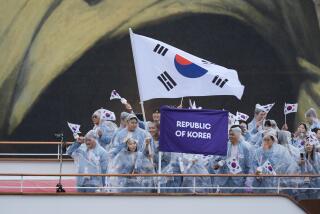IOC Will Be Mailing Out Invitations
- Share via
LAUSANNE, Switzerland — There will be a ceremony at International Olympic Committee headquarters here Thursday, when invitations to the 1988 Summer Olympics are mailed to all 167 National Olympic Committees.
Inside the envelopes will be a letter from IOC President Juan Antonio Samaranch informing the committees that he is not entirely certain to which country some of their athletes are being invited.
He will tell them that negotiations continue among the IOC, Seoul, South Korea, the city that was named in 1981 as the host, and Pyongyang, North Korea, which has demanded the right to become a co-host.
The negotiations, which began in October of 1986, have included four meetings in Lausanne and numerous other communications, including two this week.
The second, a telegram Tuesday from the North Korean Olympic Committee to the IOC, requested an indefinite postponement of Thursday’s ceremony, which is scheduled for one year before the opening ceremony in Seoul.
More intriguing was the first, a letter Monday from the North Korean Olympic Committee to the Korean Olympic Committee (KOC) recommending a meeting either in Lausanne or Panmunjom, the demilitarized zone between North and South Korea. It would be the first meeting between them that has not included the IOC.
Asked Tuesday after an IOC executive board meeting whether he considered the letter an encouraging development, Samaranch said: “Yes and no.”
Kim Chong Ha, KOC president, was en route from Seoul to Lausanne and was unavailable for comment. But when asked the same question, representatives from Seoul who were here Tuesday leaned toward no.
“We are not sure how to consider it,” said Lee Jae Hong, spokesman for the Seoul Olympic Organizing Committee. “We believe it may be just a gesture. They may be trying to take importance away from the ceremony here.”
But until North Korea is prepared to give answers, gestures will have to do.
At the latest meeting here in July, the IOC proposed that Pyongyang have five events--archery, table tennis, women’s volleyball, cycling’s 100-kilometer road race and one-fourth of the soccer tournament.
The South Koreans accepted the proposal, but the North Koreans have not responded.
Samaranch has informed the North Korean Olympic Committee through a series of telegrams that there can be no further discussions until the proposal is accepted. The latest telegram was sent to Pyongyang Tuesday, suggesting an Oct. 7 meeting in Lausanne between North Korea and the IOC if an agreement is reached before then. Samaranch also rejected the request to delay Thursday’s invitation ceremony.
“That is impossible because of the Olympic charter,” Samaranch said.
Richard Pound, an IOC vice president from Canada, said Tuesday it was Samaranch’s insistence on a response that may have influenced North Korea to directly contact South Korea.
“My guess would be that they have determined the IOC will not budge from its proposal, and that their only hope for progress is in direct negotiations with the South Koreans,” Pound said.
Asked if the North Koreans are correct in their assumption that the IOC position will not change, Pound said: “We certainly haven’t.”
That is not entirely true. Both sides have bent somewhat since 1986, when the North Koreans demanded half of the 24 sports.
While the North Koreans have not recently indicated what sort of proposal they would find acceptable, Pound said in an interview two months ago they want the official designation as co-hosts, one-third of the television revenues and at least seven events. There has been further debate about what constitutes an event.
Pound said at the time he did not believe North Korea was sincere in the negotiations.
He softened that stance Tuesday, although he admitted: “There are a lot of subjects I wish I had studied more closely at the university. Asian politics is one of them.”
Pound said the IOC’s information is that Pyongyang is preparing facilities for the Olympics and is even manufacturing T-shirts that are inscribed with “Pyongyang ‘88” and the Olympic rings.
He said he also was encouraged by Cuban President Fidel Castro’s efforts to resolve the issue. Castro, a mediator between the North Korean Olympic Committee and the IOC when discussions began, again offered his services in a telegram Monday to Samaranch.
More to Read
Go beyond the scoreboard
Get the latest on L.A.'s teams in the daily Sports Report newsletter.
You may occasionally receive promotional content from the Los Angeles Times.







